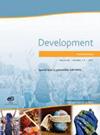An interview with Karen Sears.
IF 3.7
2区 生物学
Q1 DEVELOPMENTAL BIOLOGY
引用次数: 0
Abstract
Karen Sears is a Professor of the Department of Ecology and Evolutionary Biology and the Department of Molecular, Cellular, and Developmental Biology at the University of California, Los Angeles (UCLA), USA. Her group leverages a range of organisms, including bats and the short-tailed opossum, to study the mechanisms underpinning mammalian evolution. Karen is a Guest Editor for Development's Special Issue on Uncovering Developmental Diversity, which highlights how unconventional model organisms are advancing our understanding of developmental biology. We caught up with Karen to find out more about her research, the importance of public engagement and the challenges of working with unusual organisms in the lab.
凯伦-西尔斯访谈录
凯伦-西尔斯(Karen Sears)是美国加州大学洛杉矶分校(UCLA)生态学与进化生物学系和分子、细胞与发育生物学系的教授。她的研究小组利用蝙蝠和短尾负鼠等一系列生物来研究哺乳动物进化的基本机制。凯伦是《发育》杂志 "揭示发育多样性 "特刊的客座编辑,该特刊重点介绍了非常规模式生物如何推动我们对发育生物学的理解。我们采访了凯伦,了解了更多关于她的研究、公众参与的重要性以及在实验室中与非同寻常的生物一起工作所面临的挑战。
本文章由计算机程序翻译,如有差异,请以英文原文为准。
求助全文
约1分钟内获得全文
求助全文
来源期刊

Development
生物-发育生物学
CiteScore
6.70
自引率
4.30%
发文量
433
审稿时长
3 months
期刊介绍:
Development’s scope covers all aspects of plant and animal development, including stem cell biology and regeneration. The single most important criterion for acceptance in Development is scientific excellence. Research papers (articles and reports) should therefore pose and test a significant hypothesis or address a significant question, and should provide novel perspectives that advance our understanding of development. We also encourage submission of papers that use computational methods or mathematical models to obtain significant new insights into developmental biology topics. Manuscripts that are descriptive in nature will be considered only when they lay important groundwork for a field and/or provide novel resources for understanding developmental processes of broad interest to the community.
Development includes a Techniques and Resources section for the publication of new methods, datasets, and other types of resources. Papers describing new techniques should include a proof-of-principle demonstration that the technique is valuable to the developmental biology community; they need not include in-depth follow-up analysis. The technique must be described in sufficient detail to be easily replicated by other investigators. Development will also consider protocol-type papers of exceptional interest to the community. We welcome submission of Resource papers, for example those reporting new databases, systems-level datasets, or genetic resources of major value to the developmental biology community. For all papers, the data or resource described must be made available to the community with minimal restrictions upon publication.
To aid navigability, Development has dedicated sections of the journal to stem cells & regeneration and to human development. The criteria for acceptance into these sections is identical to those outlined above. Authors and editors are encouraged to nominate appropriate manuscripts for inclusion in one of these sections.
 求助内容:
求助内容: 应助结果提醒方式:
应助结果提醒方式:


